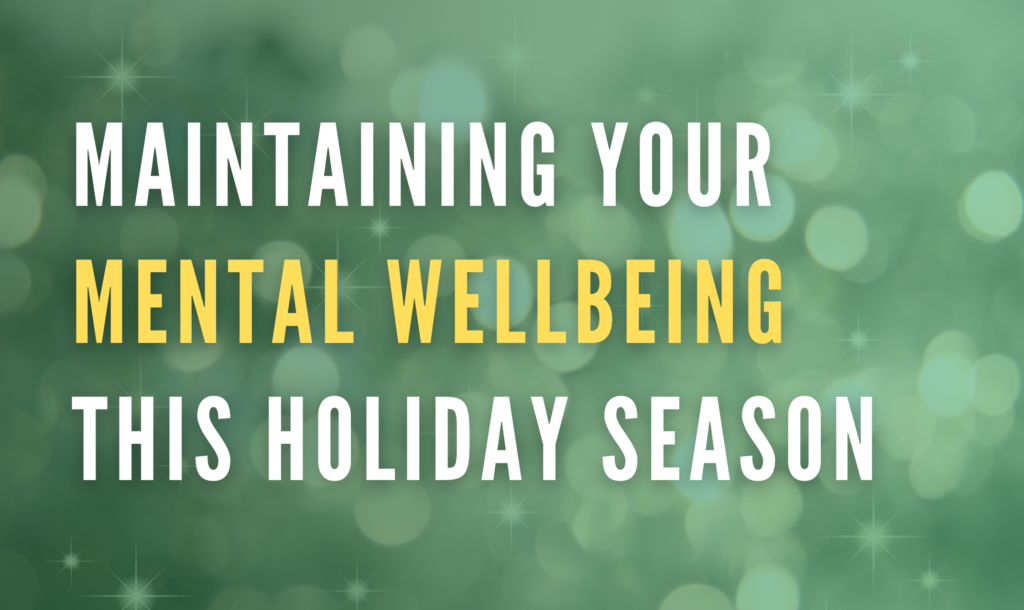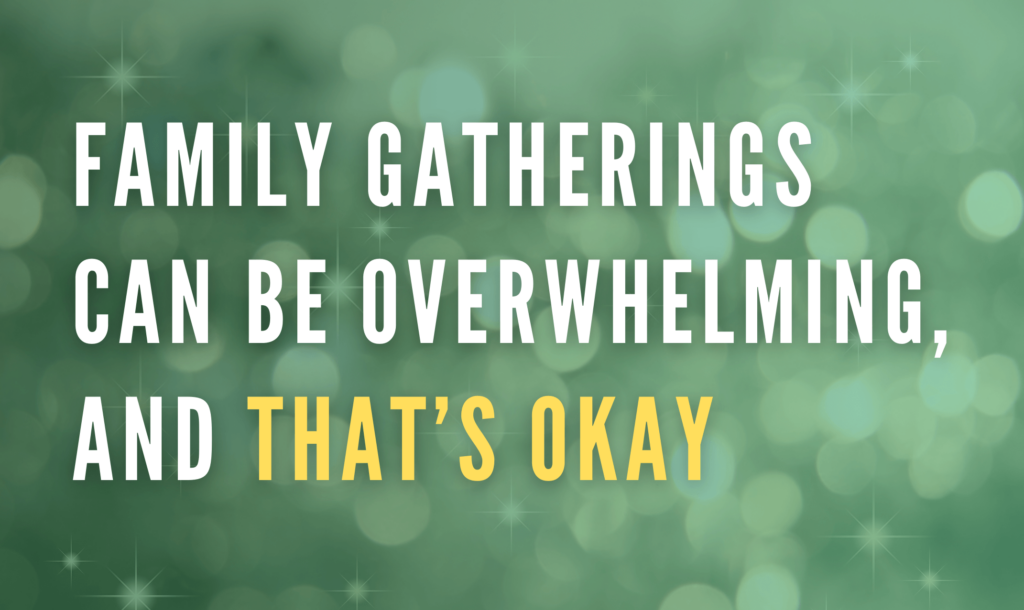The holiday season is often portrayed as a joyful and festive time, filled with celebrations and quality time with loved ones. However, for many, it can also bring stress, anxiety, and emotional challenges. We understand the complexities of this time of year and want to provide tips to help you maintain your mental wellbeing.

Why can the holidays be challenging for mental wellbeing?
Financial Stress: The cost of gifts, travel, and holiday events can add up quickly.
Loneliness: Some people may feel isolated, especially those separated from family or friends.
High Expectations: The pressure to create “perfect” holiday experiences can lead to feelings of inadequacy or stress.
Grief and Loss: Holidays often remind us of loved ones who are no longer with us.
Family Gatherings: Reuniting with family can sometimes bring up unresolved conflicts or create tension.
Disruption to Routines: Changes in diet, sleep, and daily schedules can impact physical and mental health.

What are some things I can do to make the holidays less complicated?
Set Realistic Expectations
It’s okay if your holidays don’t look like a picture-perfect movie. Focus on what truly matters to you and your loved ones. Let go of unnecessary pressure to make everything perfect.
Stick to a Budget
Plan ahead and set a realistic budget for gifts, travel, and activities. Communicate openly with family and friends about financial limits. Remember, meaningful gifts or shared experiences don’t have to be expensive.
Managing family gatherings
Family gatherings can be a source of joy – but also stress. Common stressors include:
- Old conflicts: Unresolved family dynamics can resurface.
- Overwhelming crowds: Large gatherings may feel chaotic or draining.
- Differing opinions: Conversations about sensitive topics can cause tension.

Here are some tips to help you navigate conversations during family or social gatherings:
Set clear boundaries
Be upfront about what you’re comfortable with during family discussions. Setting boundaries is a fundamental aspect of maintaining your mental wellbeing in any situation you’re in.
How to approach it: “Let’s focus on what we all enjoy talking about today!”
Example: Politely steer conversations away from sensitive topics, like politics or personal decisions, by suggesting alternative topics or activities.

Take breaks
Recognise when you’re feeling overwhelmed, and give yourself permission to step away.
Why it helps: Stepping away helps you avoid reacting impulsively and gives you time to regain perspective.
What you can do:
- Go for a short walk.
- Retreat to a quiet room for a few minutes.
- Take deep breaths to reset before rejoining the group.

Walk away if necessary
It’s okay to excuse yourself from a heated conversation or situation.
- When to use this: If a situation feels too tense or emotionally charged to handle in the moment, removing yourself can prevent unnecessary conflict.
- How to approach it: Politely say, “I’m going to grab some fresh air” or “I need a moment; I’ll be right back.”

Focus on gratitude
Shift the focus of gatherings to what you appreciate about being together. Redirection attention to the positives helps to ease tension and fosters connection.
Ideas
- Share a gratitude moment before meals
- Reminisce about positive shared memories
- Celebrate family milestones or accomplishments
More fun activities to do (especially if there are kids) can be found here.

Limit your time
If large gatherings feel draining, plan your visit for a set duration.
What this looks like:
- Arrive after the meal and stay for dessert.
- Leave early if the evening feels too overwhelming.
How to approach it: Be honest but kind. For example, “I can’t stay long, but I wanted to see everyone and wish you all happy holidays.”

Plan activities everyone can enjoy
Reduce tension by organising activities that bring people together in a fun way.
Examples:
- Board games or trivia.
- Group cooking or baking.
- Watching a holiday movie.
Why it works: Shared activities create a lighthearted atmosphere and keep conversations neutral.

Accept that some things are beyond your control
Not every family issue can be resolved, and that’s okay. Focus on what you can control—your actions and reactions.
- Tip: Use a mantra like “I can’t change them, but I can protect my peace.” This mindset helps you manage your emotions and stay calm under pressure.

For more information on our mental wellness services, visit here. To book an appointment, reach out to us via our contact us page.



